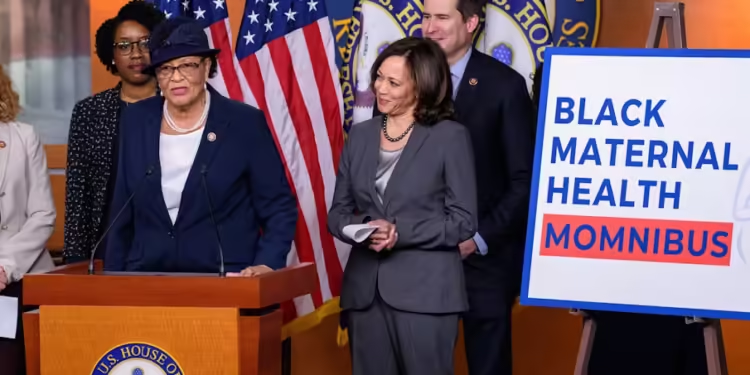May 13, 2025 Story by: Publisher
Congressional Democrats have reintroduced the Black Maternal Health Momnibus Act (“Momnibus Act”), a sweeping package of legislation designed to tackle the United States’ maternal health crisis. The package focuses particularly on the stark racial disparities that leave Black mothers at far greater risk of complication and death—despite significant proposed federal budget cuts to public health programs.
A Comprehensive “Omnibus” Approach
First launched in 2021 by Representatives Alma Adams (D-NC) and Lauren Underwood (D-IL), the Momnibus Act combines 13 individual bills into one legislative package. It directs multiple federal agencies, including the Department of Health and Human Services (HHS), to:
- Address Social Determinants of Health: Expand access to affordable housing, child care, transportation, and healthy food—factors that critically impact maternal outcomes.
- Extend Postpartum Coverage: Mandate 12- to 24-month Medicaid and CHIP postpartum eligibility, ensuring continuous care during the high-risk period after birth.
- Grow and Diversify the Maternal Health Workforce: Fund training and certification programs to increase the number of midwives, doulas, and community health workers serving underserved communities.
- Fund Community-Based Organizations: Provide sustainable grants to Black-led maternal health groups for culturally tailored outreach and support.
- Improve Data Collection and Research: Strengthen CDC and NIH studies on maternal morbidity and mortality—especially among Black, Indigenous, and other women of color—to guide evidence-based policy.
Navigating Budget Constraints
The Momnibus Act faces headwinds in a federal budget proposal that trims $2.1 billion from Maternal and Child Health Block Grants and zeroes out key programs like the Pregnancy Assistance Fund—cuts that advocates warn will exacerbate the very inequities the Momnibus seeks to address.
“Systemic racism and underinvestment have made maternal health care a lottery for Black families,” said Congresswoman Underwood, co-chair of the Black Maternal Health Caucus. “This legislation isn’t a luxury—it’s lifesaving. Even amid fiscal constraints, we should be expanding, not contracting, support for mothers and infants.”
Bipartisan Roots and Ongoing Support
While led by Democrats, the Momnibus Acts’ individual components have attracted bipartisan backing. Senator Tammy Duckworth (D-IL) and Senator Mike Braun (R-IN) co-sponsored companion bills in the Senate, reflecting widespread concern over America’s maternal mortality rate—the highest among developed nations and disproportionately borne by Black women.
Dr. Joia Crear-Perry, founder of the National Birth Equity Collaborative, praised the Momnibus as “the most comprehensive maternal health legislation ever introduced in Congress,” but warned “federal disinvestment threatens to undercut its impact, unless lawmakers of both parties prioritize the health of our mothers over arbitrary spending caps.”
What’s Next
The House Energy and Commerce Committee and related subcommittees are scheduled to hold hearings on the Momnibus package in June 2025. Sponsors aim for floor votes in the House by the summer, pressing Senate leaders to advance companion legislation before the end of the year.
As the budget debate intensifies, the fate of the Momnibus Act will hinge on Congress’s willingness to safeguard maternal health funding—and ultimately, on whether the nation can reconcile fiscal pressures with the moral imperative to protect its most vulnerable families.
Source: Black Maternal Health Caucus / Congress.gov
















